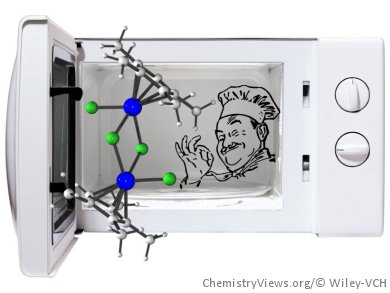Dinuclear half-sandwich complexes of the general formula [(π-ligand)MCl2]2 (M = Ru, Rh, Ir; π-ligand = arene or cyclopentadienyl) are common starting materials in organometallic chemistry. In particular, [(p-cymene)RuCl2]2 is used to synthesize various catalysts and compounds having wide application in medicinal, inorganic, and supramolecular chemistry. The standard method to make this complex was to heat hydrated RuCl3 with an excess amount of α-phellandrene in ethanol under reflux for several hours.
Kay Severin and co-workers, École Polytechnique Fédérale de Lausanne, Switzerland, optimized the synthesis of [(p-cymene)RuCl2]2 by using microwave heating in a closed vessel. With a smaller amount of α-terpinene, relative to the amount of α-phellandrene used in previous reports, they were able to obtain the product in 30 seconds. Some cyclopentadienyl analogues were also synthesized in only a few minutes instead of the typical 20 to 48 hours. Moreover, the syntheses did not require the degassing of solvents and the use of a protecting inert gas atmosphere.
Microwave heating affords dinuclear sandwich complexes within a few minutes without compromising the yields. Furthermore, the microwave-assisted syntheses require less solvent and, in some cases, lower amounts of the ligand precursor.
- Efficient and Rapid Synthesis of Chlorido-Bridged Half-Sandwich Complexes of Ruthenium, Rhodium, and Iridium by Microwave Heating,
Justus Tönnemann, Julie Risse, Zacharias Grote, Rosario Scopelliti, Kay Severin,
Eur. J. Inorg. Chem. 2013, 26, 4558–4562.
DOI: 10.1002/ejic.201300600




